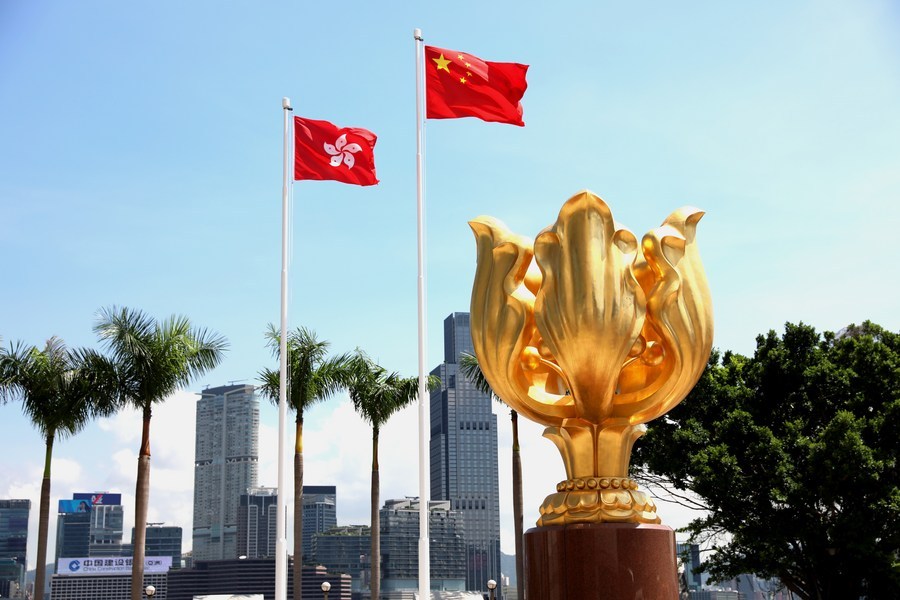Local political leaders have urged Paul Harris, the newly elected chairman of the Hong Kong Bar Association, to resign for making “irresponsible and misleading” remarks about the National Security Law for Hong Kong.

Photo taken on July 14, 2020 shows the Golden Bauhinia Square in Hong Kong, July 14, 2020. [Photo/Xinhua]
They made the remarks after Harris came under fire for calling on the central government to amend the security law, which he claimed to be at odds with the city’s Basic Law.
Leung Chun-ying, vice-chairman of the National Committee of the Chinese People’s Political Consultative Conference, said on Monday that Harris should step down from the legal body.
In a post on his social media account, the former chief executive of Hong Kong said he has doubt about where Harris’ loyalty lies, given Harris’ record as an elected councilor of the English city of Oxford until January. Leung also questioned whether a former councilor of a British city could play such an important role in the Hong Kong Bar Association. “This is absurd,” he said.
Senior counsel Ronny Tong Ka-wah, chairman of the Hong Kong Bar Association from 1999 to 2001, said he was disappointed that Harris withheld his political background when he stood for election as head of the association.
This was not something a candidate with integrity would do, Tong said, urging that Harris step down.
Someone with such a political background is not suitable to be the head of an important association that promotes development of the sector and safeguards the rule of law and justice, the former lawmaker and current executive councilor said.
Lo Man-tuen, executive director of the Hong Kong Association for the Promotion of Peaceful Reunification of China, said Harris’ remarks would give people a wrong impression that all the city’s barristers have the same views on the National Security Law.
Lo said he thinks what Harris said is “dangerous” and “misleading”, as this would taint the HKBA’s reputation as a professional association, and let the association get bogged down with accusations about “being unbalanced and unjust”.
Horace Cheung Kwok-kwan, a Hong Kong solicitor and vice-chairman of the Democratic Alliance for the Betterment and Progress of Hong Kong — the largest political party in the city’s legislature — agreed that Harris’ remarks failed to live up to his leadership position.
Harris, the Bar Association chief, didn’t provide his professional opinions through the perspective of constitutionality, but only attempted to sway the public by his personal political stand, Cheung said.
His remarks would put an association, known for its professionalism, in a dangerous situation, Cheung said.
Priscilla Leung Mei-fun, a Hong Kong barrister and lawmaker, said many barristers expressed their worries and discontent over Harris’ remarks, saying such misleading rhetoric would affect future exchanges with the Chinese mainland.
Leung stressed that what Harris said doesn’t represent all barristers in the city and it will dent the association’s image as a professional legal group.
In a Monday op-ed published in local newspaper Ta Kung Pao, Gao Jingde, chairman of the Association of Chinese Culture of Hong Kong, weighed in on the discussion on the National Security Law, which requires those holding public office to uphold the Basic Law and swear allegiance to the special administrative region.
According to Gao, anti-communists should not be allowed to run in elections for Hong Kong’s Legislative Council, District Councils, the Chief Executive Election Committee, and the deputy of the National People’s Congress.
Since Hong Kong’s return to the motherland, the opposition camp has played up its anti-communism advocacy in district and legislative elections, Gao noted. Some even used the Legislative Council, a major establishment institution, as a base to promote anti-communism ideology by constantly chanting anti-communist slogans, he stressed.
This has challenged implementation of the “one country, two systems” principle, and Hong Kong desperately needs to prevent the spread of such dangerous ideas from the institutional level, the veteran businessman said.
Such preventive measures should also be in place for schools to ensure a correct understanding of the “one country, two systems” principle and the Communist Party of China, he suggested.


